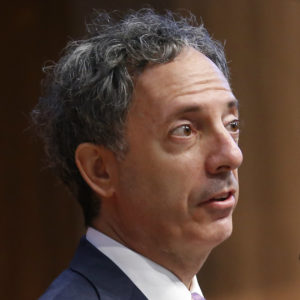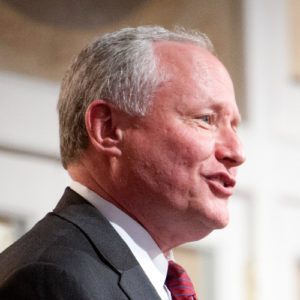Virtue & Power
Consider the relationship of virtue to political power.
June 23 – July 6, 2019
Washington, DC
In this two-week seminar, students will explore the differences between ancient and modern political philosophy, with a focus on texts by Aristotle and Machiavelli.
For the first week, led by Professor Robert Bartlett, students will focus on Aristotle’s Nicomachean Ethics and Politics. Through a close reading of these texts, students will investigate the relations between virtue and happiness and virtue and politics. Most of the week will be devoted to the Nicomachean Ethics and its study of the human good before following this study into the Politics, particularly its discussion of the kind and quality of regimes.
The second week, led by Professor Vickie Sullivan, will focus on Machiavelli, one of the most profound and challenging political thinkers. He cannot be understood merely by extracting generalizations. One has to take seriously his account of virtue and the low, but solid ground on which he recommends we construct our political regimes, and one must pay attention to particular characters, incidents, and key terms. In particular, students will explore the following themes and terms: founding, corruption, renewal, fortune vs. virtue, ordinary vs. extraordinary, appearance vs. truth, nature, necessity, acquisition, glory, and prudence. Students will read the entirety of The Prince along with excerpts from his Discourses on Livy that cast light on the chapters with which they are paired.
Image: Raphael, The School of Athens, 1509-11
Robert Bartlett on Aristotle's Guide to the Good Life
This two-week course will take place in Washington, DC. It is a full-time commitment for Monday–Friday, with required sessions in the morning, afternoon, and some evenings.

Robert C. Bartlett is the Behrakis Professor of Hellenic Political Studies at Boston College. His principal area of research is classical political philosophy, with particular attention to the thinkers of ancient Hellas, including Thucydides, Plato, and Aristotle. He is the co-translator of a new edition of Aristotle’s Nicomachean Ethics.

Robert C. Bartlett is the Behrakis Professor of Hellenic Political Studies at Boston College. His principal area of research is classical political philosophy, with particular attention to the thinkers of ancient Hellas, including Thucydides, Plato, Xenophon, and Aristotle.
He is the author or editor of eight books, including Sophistry and Political Philosophy: Protagoras’ Challenge to Socrates, The Idea of Enlightenment, Plato’s Protagoras and Meno, and Xenophon’s The Shorter Socratic Writings. He is also the co-translator of a new edition of Aristotle’s Nicomachean Ethics (University of Chicago Press, 2011). He has also published articles in the American Political Science Review, American Journal of Politics, Journal of Politics, Review of Politics, and other leading scholarly journals.
Before coming to Boston College, Robert Bartlett served as the Arthur M. Blank/National Endowment for the Humanities Distinguished Teaching Professor at Emory University. He is a graduate of the University of Toronto and holds an MA in Classics and a Ph.D. in Political Science from Boston College.

Vickie Sullivan is the Cornelia M. Jackson Professor of Political Science and teaches and studies political thought and philosophy. She also maintains teaching and research interests in politics and literature. She has published extensively on Montesquieu and Machiavelli and is the co-editor of Shakespeare’s Political Pageant.

Vickie Sullivan is the Cornelia M. Jackson Professor of Political Science and teaches and studies political thought and philosophy. She also maintains teaching and research interests in politics and literature.
She has published the monographs Montesquieu and the Despotic Ideas of Europe (2017); Machiavelli, Hobbes, and the Formation of a Liberal Republicanism in England (2004); and Machiavelli’s Three Romes: Religion, Human Liberty, and Politics Reformed (1996 and 2020). She is the editor of The Comedy and Tragedy of Machiavelli ; the co-editor of Shakespeare’s Political Pageant: Essays in Politics & Literature ; and the co-author of “Machiavelli’s Political Thought” in Oxford Bibliographies.
Her articles have appeared in The American Political Science Review, History of European Ideas, History of Political Thought, Political Theory, Polity, and Review of Politics.
Recommended Reading:
Readings:
Discussion Questions:
Readings:
Discussion Questions:
Readings:
Discussion Questions:
Readings:
Discussion Questions:
Readings:
Discussion Questions:
Recommended Reading:
Machiavelli, The Great Thinkers
Readings:
Discussion Questions:
Readings:
Discussion Questions:
Readings:
Discussion Questions:
Readings:
Discussion Questions:
Readings:
Discussion Questions:
Readings:
Discussion Questions:
Readings:
Discussion Questions:
Readings:
Discussion Questions:
Readings:
Discussion Questions:
Readings:
Discussion Questions:

Bryan Garsten
Bryan Garsten is Professor of Political Science at Yale University. He writes on questions about political rhetoric and deliberation, the meaning of representative government, the relationship of politics and religion, and the place of emotions in political life.

Benjamin Storey
Benjamin Storey is a senior fellow in Social, Cultural, and Constitutional Studies at the American Enterprise Institute (AEI), and co-director of AEI’s Center for the Future of the American University. He is concurrently an SNF Agora Fellow at Johns Hopkins University and a research fellow at the Civitas Institute at the University of Texas at Austin.

Peter Berkowitz
Peter Berkowitz is the Tad and Dianne Taube Senior Fellow at the Hoover Institution, Stanford University. He studies and writes about, among other things, constitutional government, conservatism and progressivism in America, liberal education, national security and law, and Middle East politics.

Antón Barba-Kay
Antón Barba-Kay is Associate Professor of Philosophy at The Catholic University of America, in Washington, D.C. (He is also, at the moment, Visiting Professor of Humanities at Deep Springs College, in California.) He earned his Ph.D. from the University of Chicago’s Committee on Social Thought, with a dissertation on Hegel’s Phenomenology of Spirit. The bulk of his research has concentrated on the subjects of recognition and aesthetics in nineteenth-century German philosophy. He is also writing a book about the political and philosophical implications of the digital revolution.

William Kristol
William Kristol is editor at large of The Weekly Standard, which, together with Fred Barnes and John Podhoretz, he founded in 1995. Mr. Kristol has served as chief of staff to the Vice President of the United States and to the Secretary of Education. Before coming to Washington in 1985, Kristol taught politics at the University of Pennsylvania and Harvard’s Kennedy School of Government.